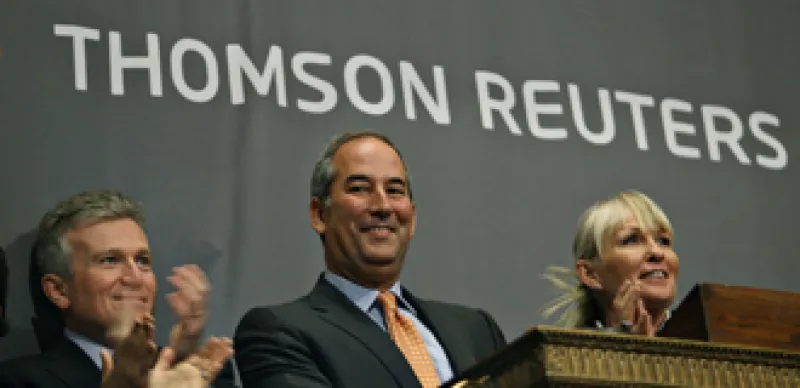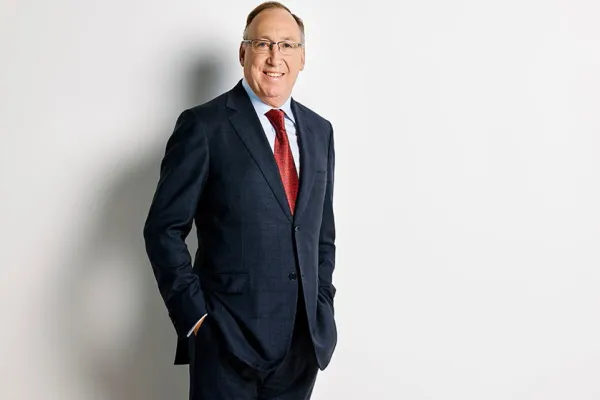“No one ever said to me, ‘No, Tom, you can’t do X.’ So I kept taking on more,” confides Tom Glocer, the 51-year-old CEO of Thomson Reuters. That formula for success took this Upper East Side New York City boy from Columbia University (class of 1981) to Yale Law School (’84) to the prestigious New York law firm of Davis Polk & Wardwell, where he did mergers and acquisitions work.
That specialty in turn helped Glocer make the leap in 1993 to Reuters America, the U.S. arm of the British news and financial data company, as deputy general counsel. Taking on more, he proved to be as good at business as law, and in 1997 he was named CEO of Reuters Latin America. Within five years he had become CEO of the whole Reuters Group, where his M&A background was to really come to the fore: In 2008, Reuters sold itself to rival media company Thomson for $17 billion, and Glocer, taking on still more, wound up heading Thomson Reuters.
Glocer’s chief chore at the combined journalism and data enterprise has been to transform Thomson, whose roots are in Canada and the U.S., into a global force through the more international Reuters’ brand. But on the side, he has had to battle another journalism–data dispenser, Bloomberg. Revenues last year, at around $13 billion, were fairly flat but with a bump up in the fourth quarter; operating profits declined 10 percent for the year, chiefly because of a batch of product launches, but did perk up in 2010’s final quarter. Since Thomson Reuters started trading in April 2008, its stock is up about 20 percent, to $39, as of March 29.
Though he’s an avid blogger (tomglocer.com), Glocer has never formally been a journalist — a fact he insists is an advantage: It keeps Thomson Reuters’ journalists safe from editorial meddling.
Institutional Investor Staff Writer Julie Segal recently spoke to Glocer in his capacious office high above New York’s Times Square about the prospects for traditional Thomson Reuters–style journalism, particularly in light of the alternative media’s coverage of (and role in) the upheavals in the Middle East.
Bloggers and social networks are now widespread information sources, as we saw again in the Middle East. What does that mean for traditional media?
It raises the need for, and puts a premium on, an authoritative voice. It is truly remarkable that so much social media technology — Twitter, Facebook, etc. — is being used for its democratizing potential. Think about your average African coup 20 years ago: One tank went to the presidential palace, another to the radio station, because whoever controls that can broadcast that general so-and-so’s loyal forces are in power. You can’t do that anymore. It’s harder to get a stranglehold on communication, for better and worse.
But where does traditional media fit into this scenario?
The challenge becomes, how do you assess, from a stream of tweets, what is really going on? One way is you follow a particular person on Twitter. Or maybe there’s an algorithm to determine that 90 percent of what’s coming in says [Muammar] Gaddafi will resign, and therefore you can give it more credence. But the other way, of course, is to have eyewitness reporters on the ground. People can rely on the fact that we’ve vetted and hired the particular journalist [on the scene], that there’s X amount of training involved, that there are editing standards. We have a reputation. If you get it wrong enough, people will turn you off.
Then, does conventional journalism still have a future?
Well, we at Thomson Reuters have an easier task than journalism at large because our clients are professionals who need not just news but also the data and analytics to interpret it.
Are you optimistic about ordinary journalism?
Listen, I’m pretty optimistic. A lot of people have gotten stuck on the idea that newspapers equal journalism and that since a bunch of U.S. newspapers have died and the ones still alive seem to be struggling (or at least were until this year), quality journalism is therefore dead. That’s untrue — and rather unimaginative, actually. There is today, and there will continue to be, an increasing amount of quality journalism. It may emanate from institutions with different names, but we at Reuters are very dedicated to being one of them.
Speaking of newspapers, how will people be getting their news?
To me, “multiplatform” just means that you need to reach people and tell them stories in ways that fit the way they live. We do more and more things on a mobile basis; therefore, mobile has got to be an important part of it. Video is important as well. We launched a service last year called Reuters Insider that is an innovative, clip-oriented business video system. We’re going to see more of a collaboration between citizen journalism and Twitter-type things and established journalism.
Reuters combines journalism with data. What’s magical about that pairing?
What’s magical is that our users really need the content. We don’t give people raw news. We integrate news into an all-around product that fits the way folks work. And we’re now doing it not only in finance. We recognize that other professionals — lawyers, accountants, pharmaceutical research execs — also have a need for specialized news as part of their day. So we’re hiring a lot of journalists this year in those areas.
How goes your own shift from paper to digital?
It’s by and large complete. I don’t think any other media company has done as much. About 90 percent of our $13 billion in revenue is electronic. There’s a huge amount of hand-wringing in the music industry, in the newspaper industry [over this process]. But we’ve gone from 100 percent print to verging on 100 percent electronic without having the bottom drop out of our profits. And also without a lot of “Oh, we need to reinvent ourselves” or “There should be a government subsidy” or “We can’t make a go of it with our business model.”
What have you learned from writing a blog. And do you write it?
I write it. I’m sure McKinsey would write me a study of the phenomenon of blogging for a million bucks, and I’d get a 100-page thing with lots of graphs and information. I’d probably learn some things. But I’m not sure they would stick with me or change me. The alternative is experiential learning. When I started the blog, I just said, Well, let me try to do it and see what happens. What I found was, No. 1, as long as I don’t have to do it five times a day, I quite like it. And I have particularly good interaction with people in the company. Although I do all the normal communication things internally, writing something that goes outside the company, that anyone can get at, somehow makes it more authentic. People in the company — and we now have 57,000 or so — can get to know me. There’s more intimacy that comes from writing about my kids or writing about my grandmother’s struggles with a computer.
How do you stay on top of a company that operates in more than 150 countries?
The old Reuters ran on quite a simple model. It was geographic. When I ran the business in Latin America, I had a great deal of autonomy. I had to deliver a certain number, but how I went about it could differ greatly from how the person in Canada or Switzerland did it. Now, there are benefits to that approach. You’re close to your customers. You don’t need to go back to London or New York for an answer. However, our clients were becoming more globalized. Deutsche Bank wanted the same application in London, New York and Buenos Aires, and wanted the same level of service, and wanted a single bill, and wanted a single point of contact. The challenge of organizing country by country started to be too great. Today our markets division is essentially organized by sales and trading; by investment and advisory, which is essentially off the trading floor; by enterprise; and by our media business. The business is now aligned and organized around the client, not a geographic region.







